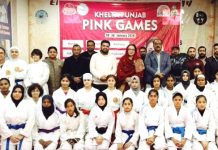Prime Minister officially inaugurated the polio campaign across the country.
(Asghar Ali Mubarak)
Prime Minister Shahbaz Sharif while inaugurating the nationwide polio campaign has said that the federal government will work with the provinces to eradicate the polio stain on Pakistan’s forehead.
The Prime Minister officially launched the polio campaign across the country by administering polio drops to the children.
Addressing the ceremony on this occasion, the Prime Minister said that today we have started the polio campaign here and I think that our campaign is being launched under the supervision of a very capable team and I sincerely hope that the federal The government will work with the provinces to eliminate the polio stain on the forehead of Pakistan. He said that it is hoped that the disease will go away from the borders of Pakistan forever and will never return again.
He said that our polio team, polio officials especially in the areas where security is a problem, along with the security personnel will bring out the effective results of this campaign and it will end in the coming months and years.
Shahbaz Sharif appreciated the efforts of the polio team and said that with the collective efforts of all of you, we will be able to effectively deal with this challenge and again polio will not be able to rise in the borders of Pakistan.
It should be noted that the vaccination campaign will continue from September 9 to September 13 in 115 districts during the massive polio campaign launched by the government.
Ayesha Raza Farooq, Prime Minister’s focal point for polio eradication, said that the teams will go door-to-door in 115 districts and vaccinate 33 million children under the age of five.
36 districts of Balochistan have also been included in this campaign, where 12 cases have been reported so far this year.
It is also worth mentioning here that this year, the first case of polio virus was reported in Islamabad after 16 years and for the first time since 2008, polio virus was confirmed in an 8-year-old child.
National Institute of Health’s Regional Reference Laboratory for Polio had informed that a fresh case of polio has been reported in Union Council Rural 4 near Sangjani Toll Plaza in Islamabad.
It should be noted that In Sindh, the situation is dire after three years of zero number polio cases as during the former EOC Sindh Coordinator Fayaz Hussain Abbasi maintained strong surveillance and monitoring but unfortunately the legacy could not be retained due to drastic change in policy and planning to fight against polio in the current regime. The recent diagnosis of a 29-month-old girl with polio in Hyderabad, despite ongoing vaccination efforts, underscores the vulnerability of children, particularly in underprivileged and malnourished communities. This case, marking the third in Sindh this year, brings the nationwide total to a disconcerting 16. Each case is not just a statistic but a devastating blow to the child’s future and a collective failure of the system tasked with protecting our most vulnerable. Karachi presents another layer of complexity in this fight against polio. In an effort to tackle these challenges, the Emergency Operation Center for Polio in Sindh has taken proactive steps, including organizing an interactive orientation session in Karachi. The detection of the virus in the Gulshan Ravi Disposal Station, as reported by Punjab’s anti-polio program, is particularly troubling.
This development necessitates an urgent and comprehensive response from provincial authorities, who are preparing to launch an emergency vaccination campaign to contain the potential spread. However, the challenge extends beyond merely deploying vaccines. The emergence of polio in such an urban center raises questions about the efficacy of the ongoing anti-polio campaigns and the robustness of public health infrastructure in managing and monitoring such threats. The session aimed to raise awareness and mobilize public support for the anti-polio efforts. Captain (Retd) Anwar ul Haq, National Coordinator for the Emergency Operation Center for Polio, announced a collaborative initiative with Afghanistan to launch synchronized polio campaigns on both sides of the border. This cross-border collaboration, planned for September, October, and November, is a critical step towards the total eradication of the virus. However, even as these efforts are commendable, the recent increase in polio cases, as noted by Anwar ul Haq, reflects significant lapses in the existing strategies.
The current campaign in Karachi led by Coordinator of the Emergency Operation Center in Sindh Irshad Ali Sodhar has incorporated modern technology, providing both oral vaccinations and fractional doses of the Inactivated Polio Vaccine (IPV). Yet, the effectiveness of these advanced measures is severely hampered by the prevailing resistance among a significant portion of the population. The ongoing special polio campaign in Karachi, targeting 85 high-risk union councils, is crucial to preventing further spread. It is pertinent to mention that Daily Metro Morning has already published a report on alleged mismanagement in PTP M9 Toll Plaza of Jamshoro district, where senior and trained workers were terminated, while the new hiring was accused for nepotism and sheer discrimination of merit. The same Jamshoro district has received WPV1 ES positive after three years as always ES negative during Fayaz Abassi’s era.
However, its success hinges on more than just the administration of vaccines. Overcoming parental resistance through education and community engagement is paramount. Authorities must prioritize outreach programs that address fears and misinformation while emphasizing the critical importance of immunization. As Pakistan faces the resurgence of polio, the stakes have never been higher. The virus not only threatens the health and future of the nation’s children but also endangers global public health efforts. The collaboration with Afghanistan and the synchronized campaigns offer a beacon of hope, but the path to eradication will require more than just vaccines. It demands unwavering commitment, collective action, and a renewed focus on public trust and community involvement. The time for complacency has long passed. As we stand at this critical juncture, the eradication of polio in Pakistan is not just a public health necessity but a moral imperative. We must act now, with resolve and determination, to ensure that future generations are free from the scourge of polio.
The confirmation of the polio virus in Lahore’s sewage samples by the National Institute of Health (NIH) in Islamabad is a stark reminder of the enduring threat posed by this crippling disease in Pakistan. Despite the country’s concerted efforts to eradicate polio, the detection of the virus and the rise in reported cases across the nation highlight significant gaps in the immunization and public health strategies that demand immediate attention. The staggering 27 percent refusal rate by parents on the first day of a special polio vaccination campaign is a significant roadblock. This resistance, fueled by misinformation and distrust, highlights the critical need for a sustained, well-coordinated public awareness campaign. The reluctance of parents to vaccinate their children not only endangers individual families but also undermines the broader public health goal of eradicating the virus.















